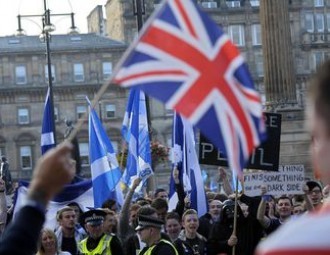Ulad Vialichka: Scotland implemented a safe scenario, choosing between better and the best

Referendum in Scotland was of use not only to the Scottish, but also to the supporters of united Europe.
Let us recall that on September 18 at the plebiscite in Scotland 44.7% have voted for the independence from the United Kingdom and 55.3% have voted contra.
“EuroBelarus” Information Service asked Ulad Vialichka, the head of the International Consortium “EuroBelarus” to comment on this referendum.
- I think that it was one of the most intriguing events in Europe’s inner political development over the last time. Scotland has implemented a safe scenario, choosing between better and the best. As even the final answer “no” means additional rights and preferences for the Scottish.
It would be inappropriate to compare the situation with the referendum in Scotland with the separatist aspirations in Ukraine. These situations are completely different. Scotland doesn’t experience external threats that Ukraine feels from Russia. And in this situation the choice of the Scottish is quite positive for Europe.
Scotland didn’t establish a precedent that could become an example for the peoples trying to take the same path: Catalans, Basques, and others. But a precedent of referendum on independence did take place.
The choice made during the voting is by implication working for the idea of united Europe. Besides, it should be noted how democratic this declaration of will was happening and that any attempts to try make people act according to the authorities’ will took place. And the Crown almost didn’t make any statements regarding how the Scottish should have voted. I.e. Scotland demonstrated a certain example of how referendums should look like in the society where people citizens’ opinion is really respected.
-
03.01
-
07.10
-
22.09
-
17.08
-
12.08
-
30.09










































